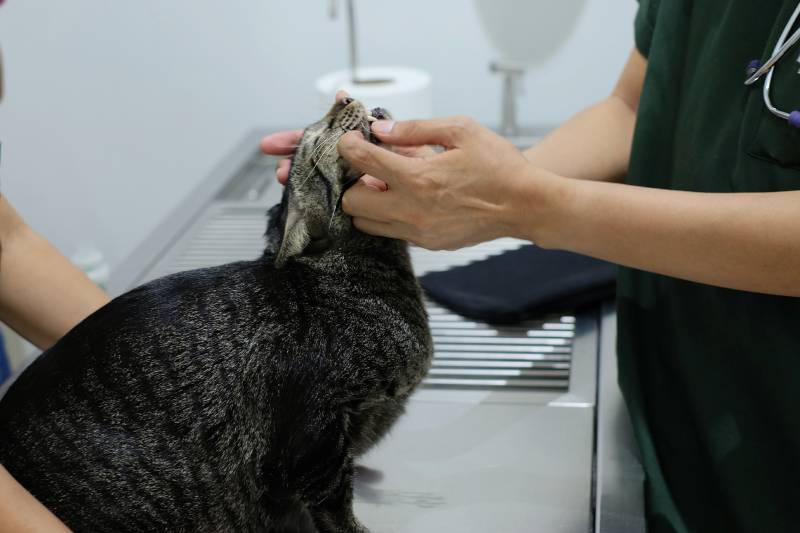
If your cat eats something they aren’t supposed to, decontamination (the removal of harmful or poisonous substances) may be required. What action to take will depend on what was consumed, but in poisoning cases, one of the options used to decontaminate is called activated charcoal. This product is a gastrointestinal (GI) absorbent that can be used to bind to drugs or harmful substances, with the goal of keeping them from further harming the body.
Should activated charcoal be used in cats? The short answer is, yes, but only in the correct circumstances! In this article, we will discuss what those circumstances may be, as well as the breadth of activated charcoal’s uses and potential side effects. Read on to find out more!
What Is Activated Charcoal?
As mentioned, activated charcoal is one potential option for GI decontamination in veterinary medicine. Some other decontamination options include inducing vomiting (unlike dogs, there are no safe options to be done at home for a cat; only injectable drug options in a veterinary setting) and gastric lavage (tube placed in an anesthetized pet from mouth to stomach to get the stomach contents out).
Activated charcoal is an absorbent that is given to help lessen or prevent drugs and toxins from being further absorbed into the body. The product can be made from heated and treated material, often wood, peat, coconut, or pecan shells. These prepared substances have a large pore size and a large surface area that absorbs many chemicals, drugs, toxins, or even some bacterial by-products. The activated charcoal coats the inside of the digestive tract and binds to specific susceptible toxins. This prevents toxins from being further absorbed until it is eventually expelled in the feces.
The brand ToxiBan is widely used in veterinary medicine and can come as a suspension or as granules. It is stored at room temperature in the manufacturing bottle it comes in. Other brands can include Acta-Char, Charcodote, or other generic brands. ToxiBan with Sorbitol consists of activated charcoal and the ingredient sorbitol, which is a cathartic agent. This means it helps the product move through the gastrointestinal system quicker and flush out toxins faster than activated charcoal without sorbitol. If a sorbitol-containing product is used, it can only be given once in a decontamination event as it can lead to further dehydration and electrolyte changes. Subsequent doses would be just activated charcoal (without sorbitol).

How Is Activated Charcoal Given?
In veterinary medicine, activated charcoal is typically given by mouth. This can be done via a syringe in the form of a liquid slurry (with a small amount of water and/or canned food). It can also be given via a nasogastric tube (tube placed from nose to stomach) or an orogastric tube (tube placed from mouth to stomach). The specific dose amount will be dependent on a few factors including the cat’s weight, the product ingested, as well as the timing of how long ago the consumption occurred.
Sometimes depending on the product and timing, activated charcoal will not be recommended, one dose will be utilized, or multiple doses of activated charcoal may be warranted. In these cases, activated charcoal can be given every 4–6 hours for 3 to 4 total doses. Because activated charcoal is a very messy substance (resembling black tar!), it is usually given in an area that can be easily cleaned. It is also well known to stain fabric so disposable gowns and towels are often utilized.

What Happens If You Miss a Dose?
Because it is recommended for veterinarians and their trained staff to give this product, it is not a medication that should be given by and therefore missed by a cat owner. You’re in luck…one less thing to have to think or worry about!
Potential Side Effects of Activated Charcoal
Although activated charcoal is not absorbed itself, it has some potential side effects that are helpful to be aware of. Some of these are listed as follows.
Some concurrent medical conditions that typically prohibit using activated charcoal include:
Frequently Asked Questions (FAQs)
I’ve seen activated charcoal available over the counter; can I try to give it at home?
This is not recommended for several reasons. Poisoning often poses a life-or-death emergency to your pet, and time is of the essence! Based on various factors, activated charcoal may or may not be on the table as an option for part of a treatment plan. Because of this, contacting your veterinarian right away with as much information as you have is the best course of action you can take for your cat. You can also contact the Pet Poison Helpline or ASPCA Animal Poison Control. These companies are open 24 hours per day, and they employ veterinarians that are board certified in toxicology and can provide medical advice to pet parents and/or veterinary professionals in the event of toxin or poison ingestion.
It’s also important to note that over-the-counter activated charcoal products typically do not work as well as medical products that are available commercially in the veterinary setting.
What are some ingested substances that activated charcoal may be given for and bind to?
What are some ingested substances that activated charcoal will not work for or bind to?

 Conclusion
Conclusion
If your cat has ingested a toxic or poisonous substance, this is an emergency! Activated charcoal is an absorbent that can be a helpful tool in preventing some products from being further absorbed into the body. Considering several different factors, your cat’s veterinarian will be able to help determine if this product is an appropriate treatment for your cat.
See also:
- Can Cats Have Milk of Magnesia? Vet-Approved Facts & Safety Tips
- Japanese Akita Inu vs American Akita: The Differences (With Pictures)
Featured Image Credit: andasea,Shutterstock







